Torta Della Nonna Recipe (Italian Custard Tart)
Updated May 05, 2025, Published Mar 27, 2024
This post may contain affiliate links. Please read our disclosure policy.
Torta Della Nonna Recipe (Italian Custard Tart)– this iconic classic Italian dessert means “grandmother’s cake”—an exquisite Italian custard tart showcasing a buttery shortcrust pastry that cradles a luscious lemon and vanilla-infused custard. The delicate balance of buttery richness, creamy smoothness, and a hint of citrus makes each bite a timeless indulgence. A beautiful dessert for any occasion!
You’ll also love Crumb Cake and Italian Olive Oil Cake.
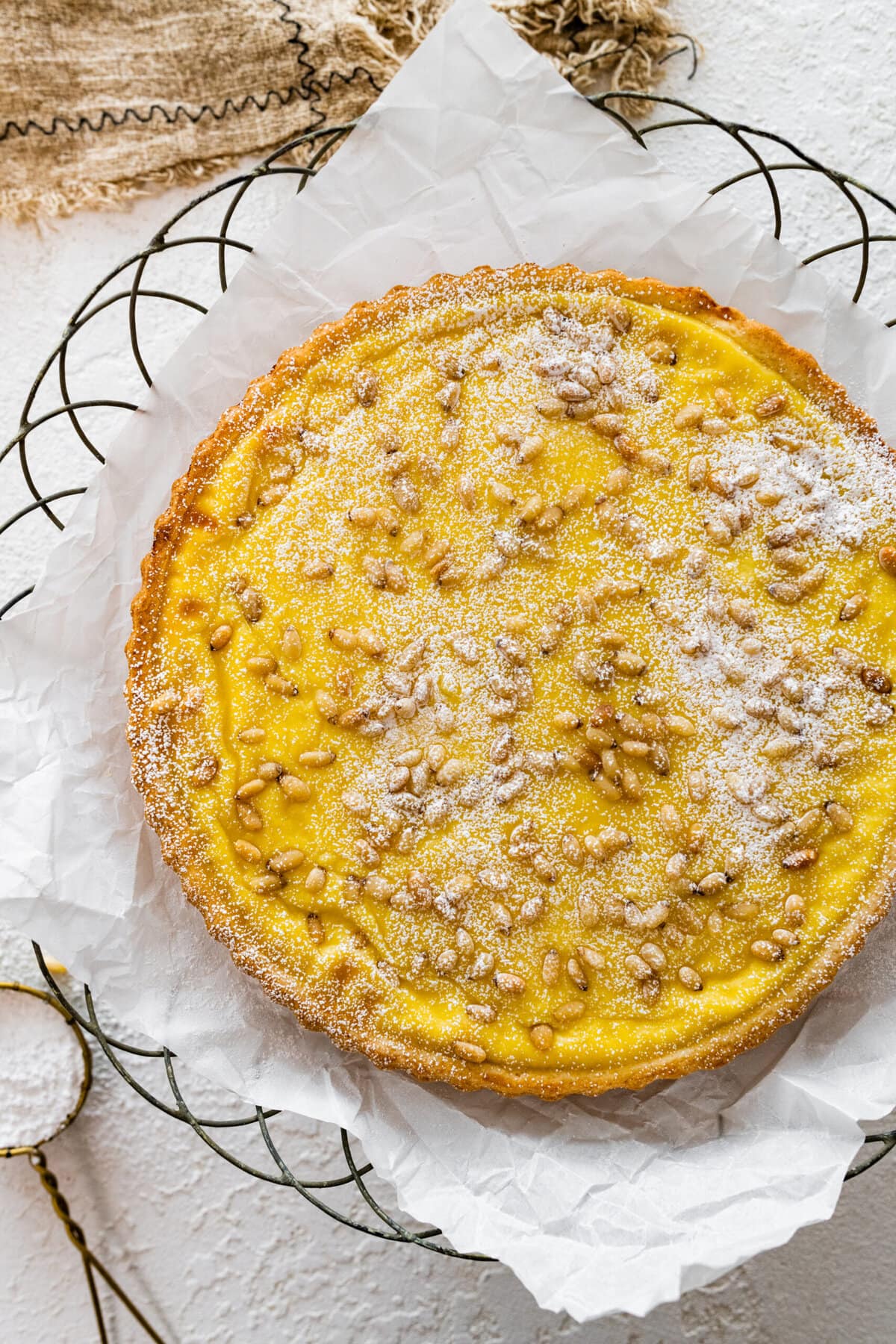
Why you’ll love this recipe
This recipe captures the authentic flavors and textures of a traditional Italian dessert! Many recipes call for a bottom and top crust, but we skip the top crust for a more modern look that is very common now.
- Homemade Goodness: Making both the pastry and luscious Italian pastry cream from scratch ensures a homemade touch, allowing you to savor the satisfaction of creating a delightful Italian treat in your own kitchen.
- Impressive Presentation: The tart’s layered structure and dusting of powdered sugar make it visually appealing, making it a beautiful centerpiece for any dessert table.
- Nostalgic Charm: If you have a fondness for traditional and timeless recipes, Torta della Nonna brings a nostalgic charm that can transport you to the heart of a rustic Italian kitchen- just like my nonna’s.
- Balanced Sweetness: The balance of sweetness in both the pastry and custard ensures a dessert that is indulgent without being overly sugary, appealing to a broad range of tastes.
I can’t wait for you to try a slice of this torta della nonna recipe! You’ll also love Cream Filled Doughnuts, Fruit Tart Pastry Cream, Easy Ricotta Cake, and Panna Cotta. See more: Traditional Italian Easter Menu.
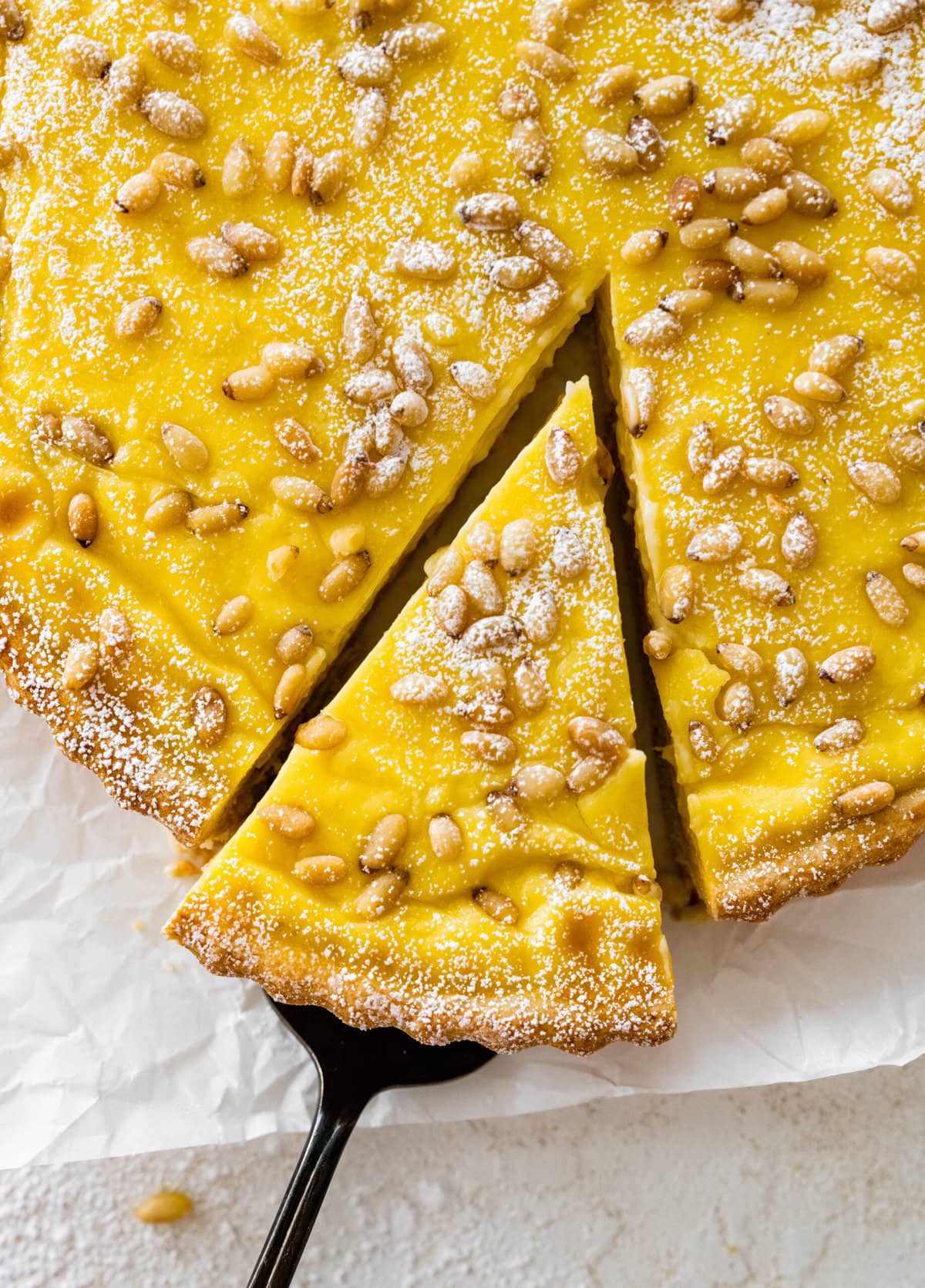
Table of Contents
Simple Ingredients
With a few simple ingredients, you are on your way to making this traditional Tuscan dessert.
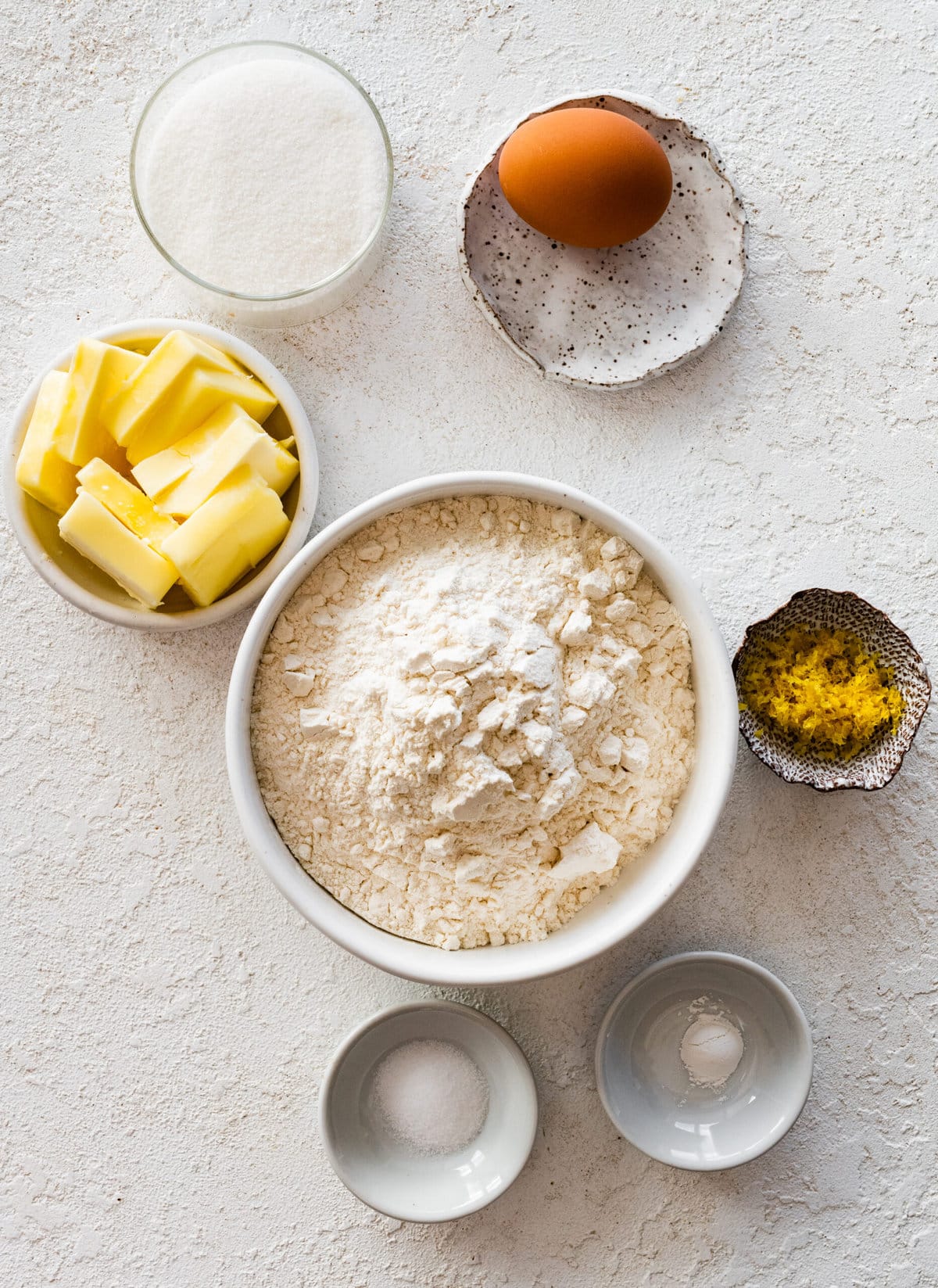
Pasta Frolla (Shortcrust Pastry or Pasta Frolla):
- All-purpose flour: Provides the base for the pastry, giving it structure.
- Granulated sugar: Adds sweetness to the pastry.
- Salt: Enhances the flavor and balances the sweetness.
- Baking Powder: leavening agent
- Butter: Contributes to the flakiness and richness of the pastry.
- Egg: Binds the ingredients together and adds moisture.
- Vanilla extract or Lemon zest (optional): Adds a subtle flavor to the pastry.
- Cold water: Used as needed to adjust the dough consistency.

Itlaian Pastry Cream (Crema Pasticcera):
- Egg yolks: Provide richness and help thicken the custard.
- Granulated sugar: Sweetens the pastry cream.
- Cornstarch: Acts as a thickening agent for the custard.
- Whole milk: Forms the base of the custard, making it creamy.
- Vanilla bean or Vanilla extract: Infuses the custard with a delightful vanilla flavor.
- Zest of half a lemon: Adds a hint of citrus brightness to the custard.
- Pine nuts: crunchy pine nuts offer the classic touch and give a bit of texture.
- Powdered Sugar: a touch white on top adds a pretty touch.
See the recipe card for quantities.
How to Make Torta Della Nonna (Photo Instructions)
Follow these step-by-step photo instructions to make this delicious cake. Detailed instructions are in the recipe card below.
Pastry Cream
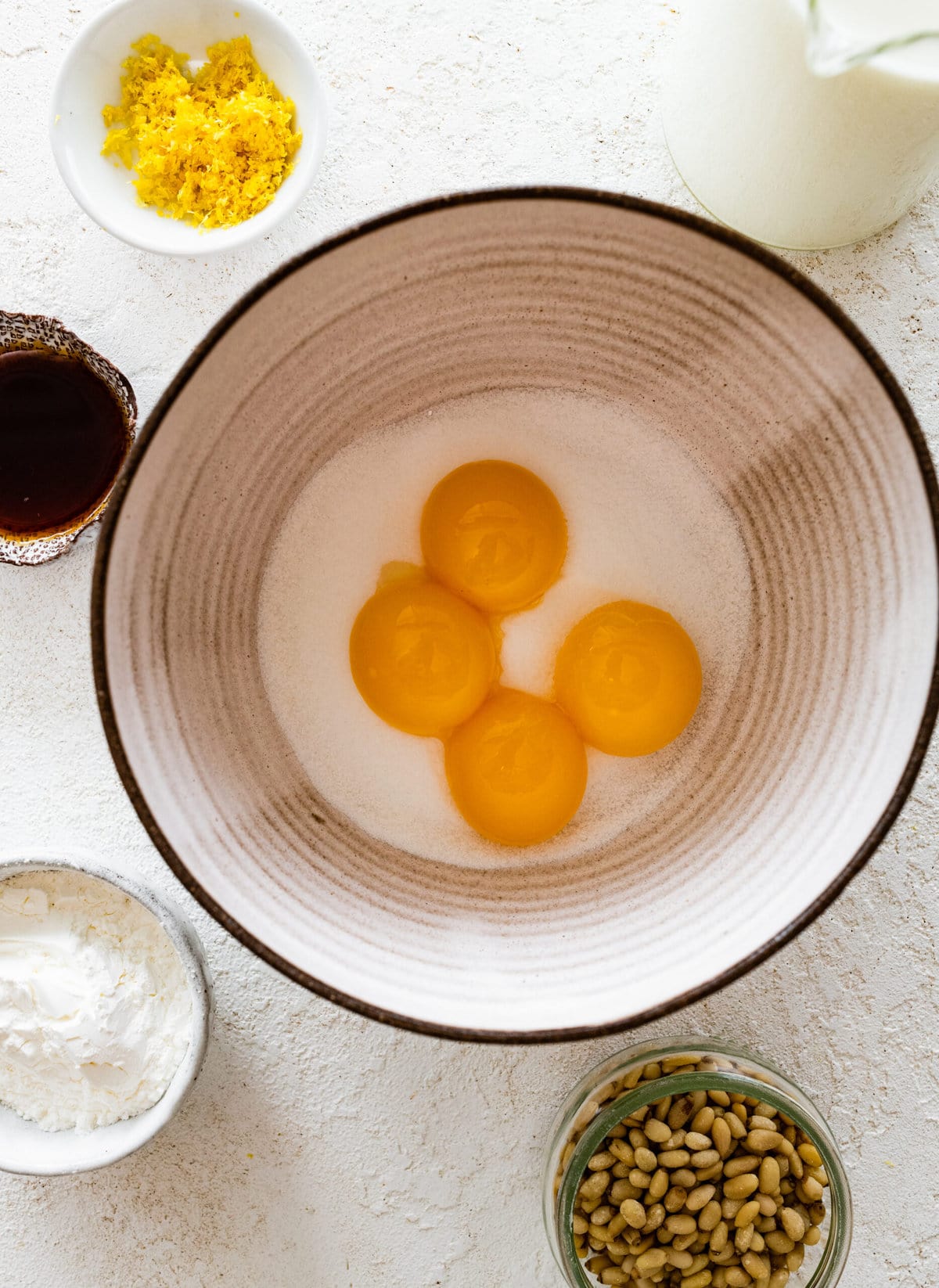
In a bowl, whisk together the egg yolks and sugar until pale yellow and creamy; use an electric mixer.
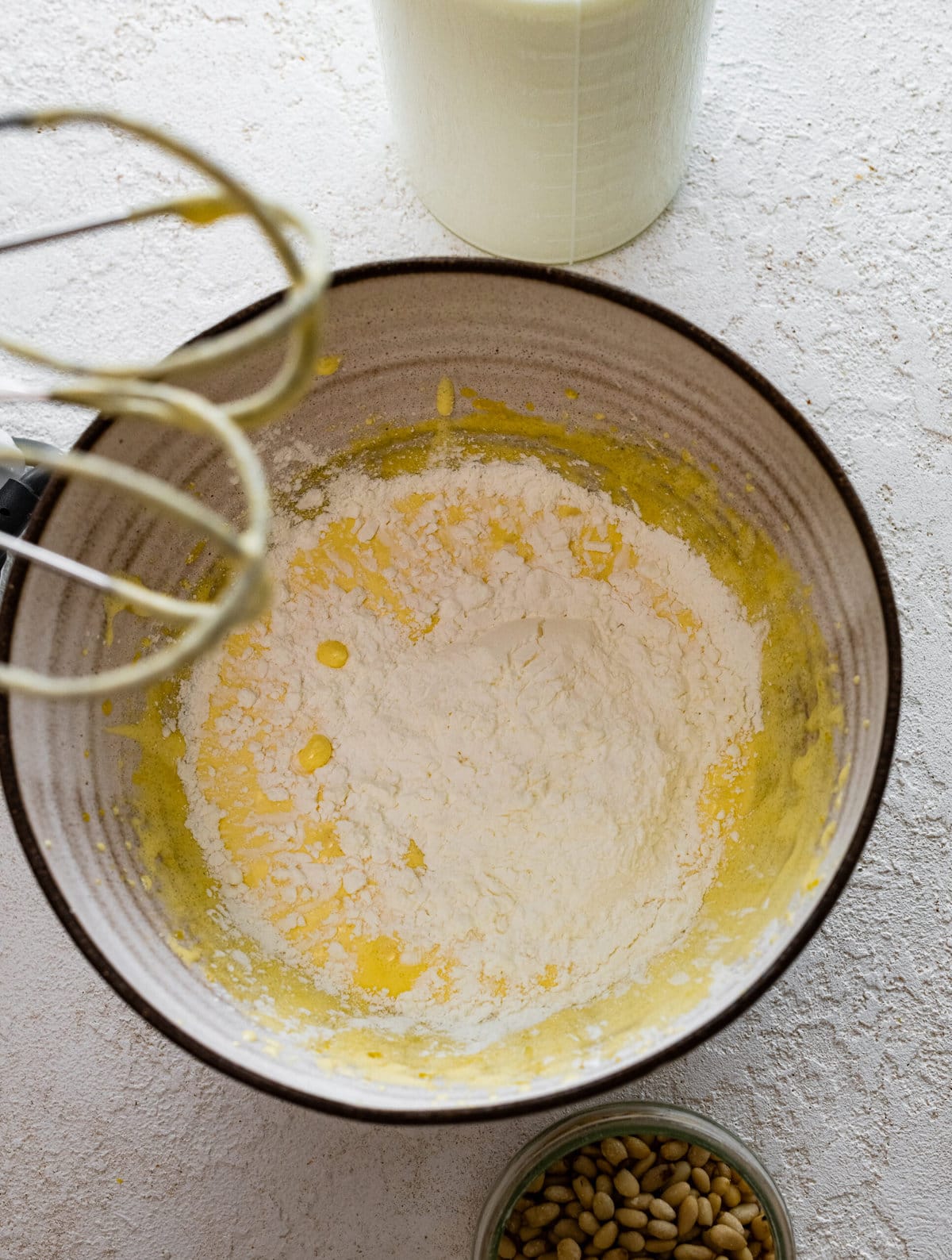
Add the cornstarch and mix well.
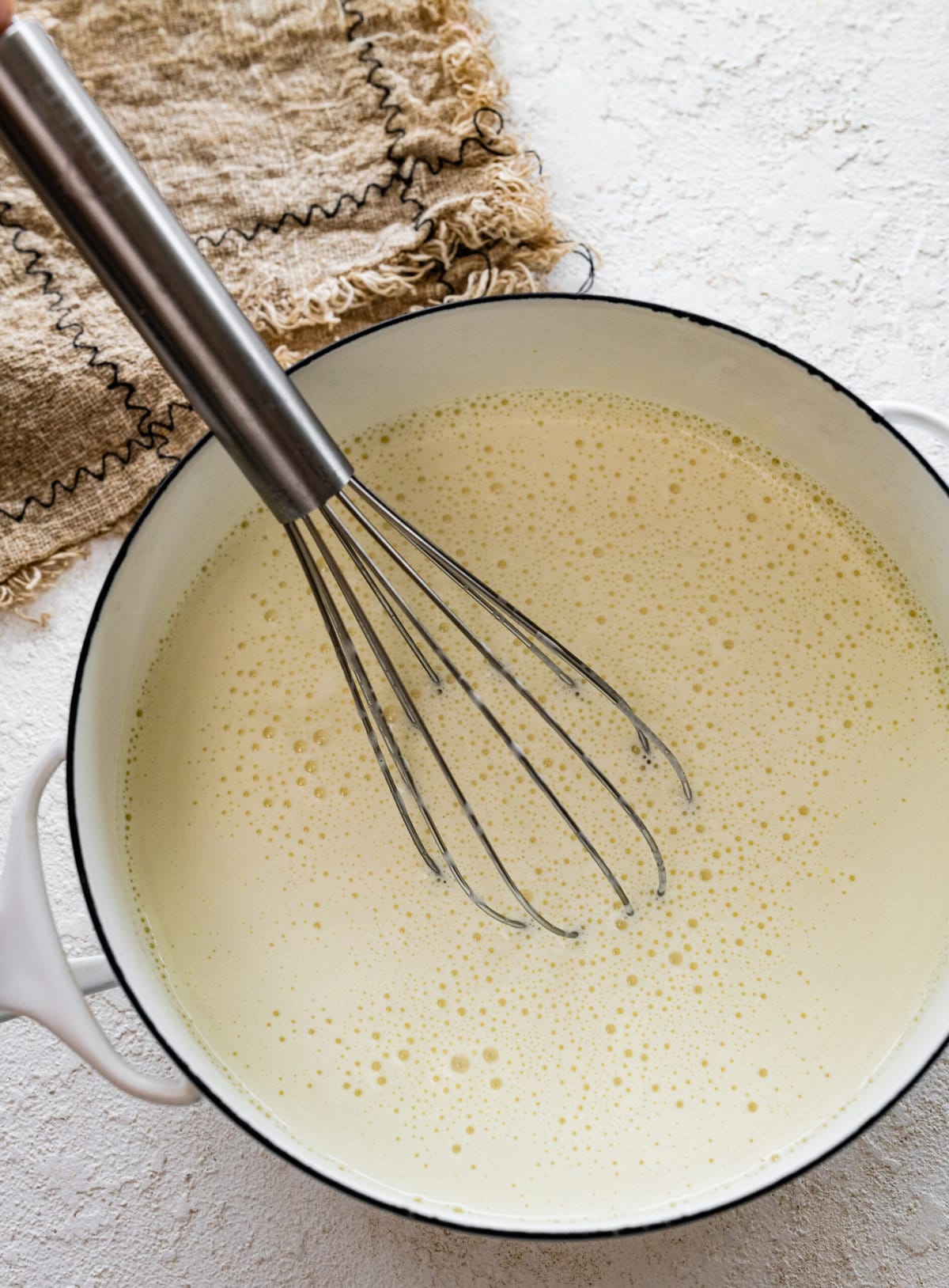
In a saucepan, heat the milk with vanilla bean (or extract) and lemon zest until it just starts to simmer. Remove from heat.
Slowly pour the hot milk into the egg mixture, whisking constantly to avoid curdling.
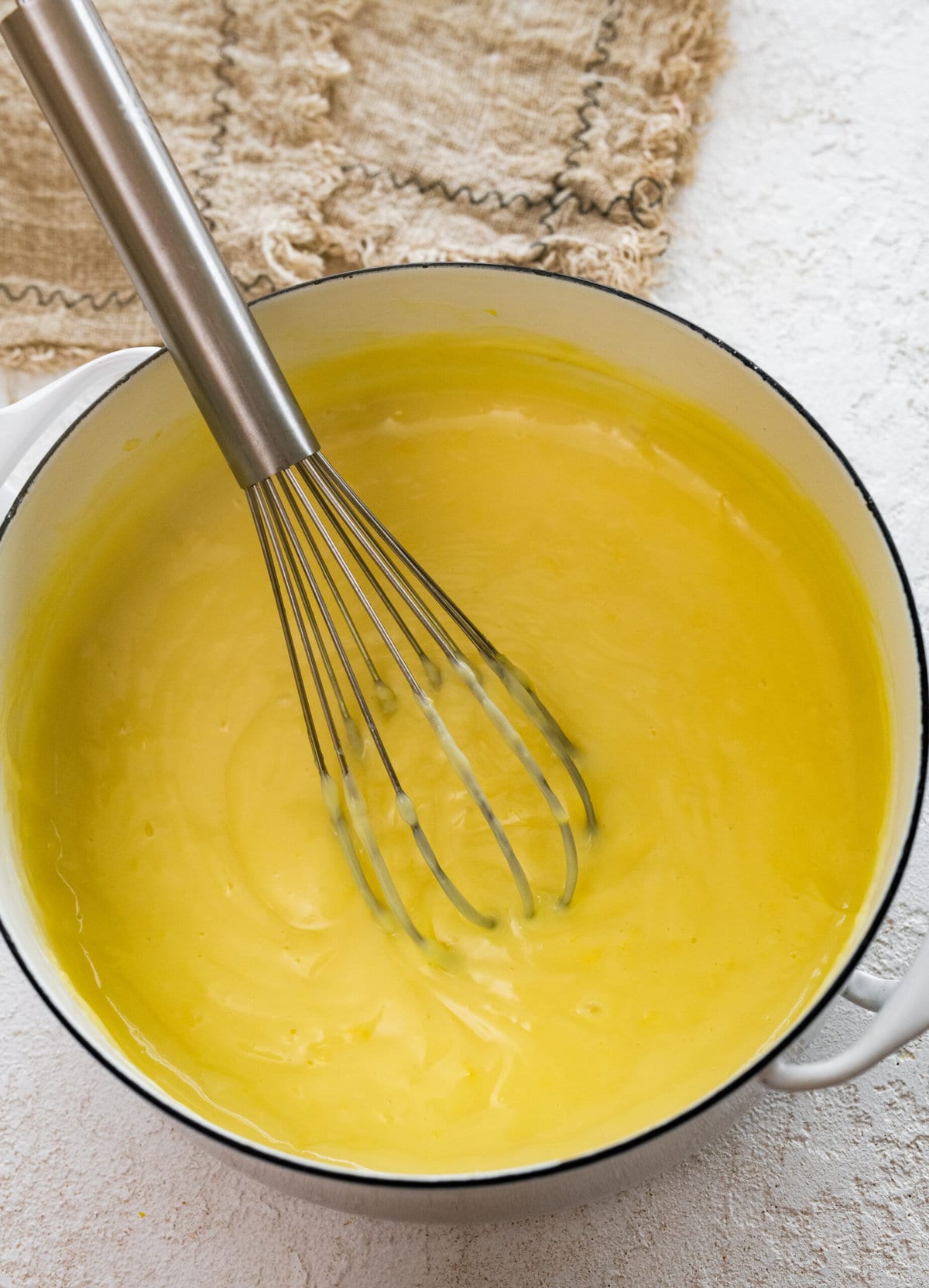
Pour the mixture back into the saucepan and cook over medium heat, stirring continuously until the custard thickens. This should take about 5-7 minutes. Once thickened, remove from heat and transfer the pastry cream to a clean bowl.
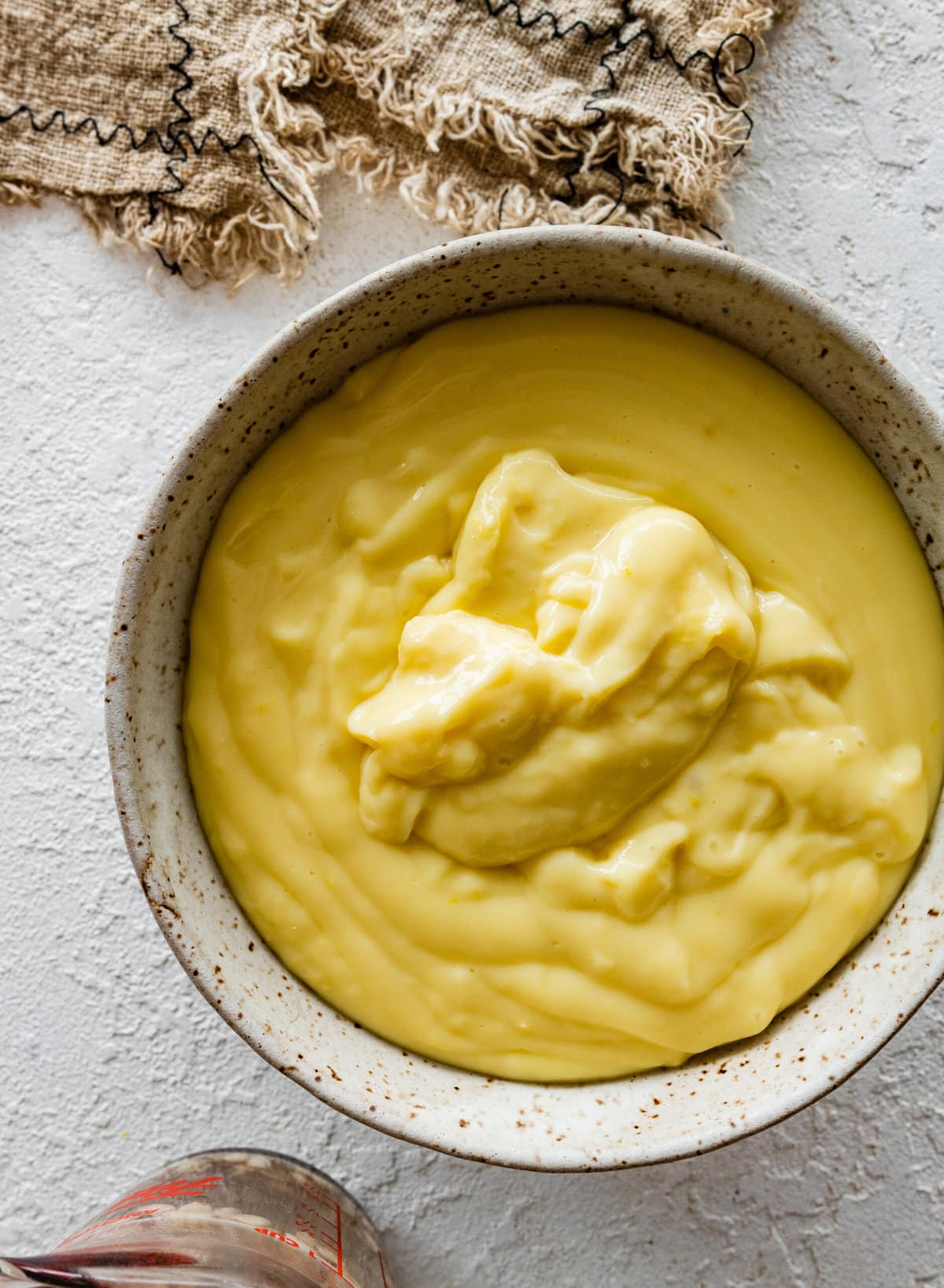
Pastry Dough
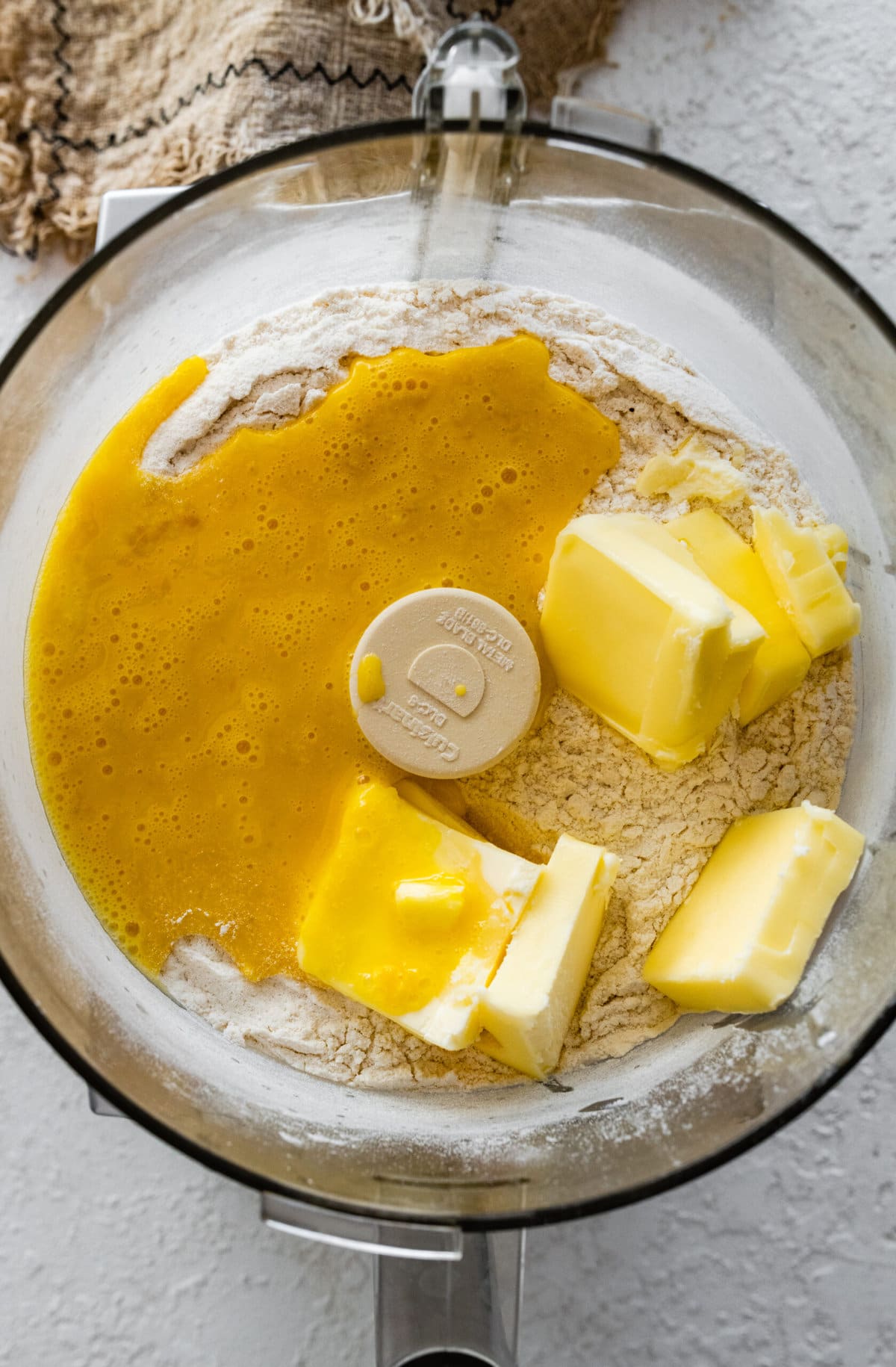
In a large bowl, combine the flour, baking powder, sugar, and salt. Wisk to combine.
Beat the egg in a small bowl with the lemon zest.
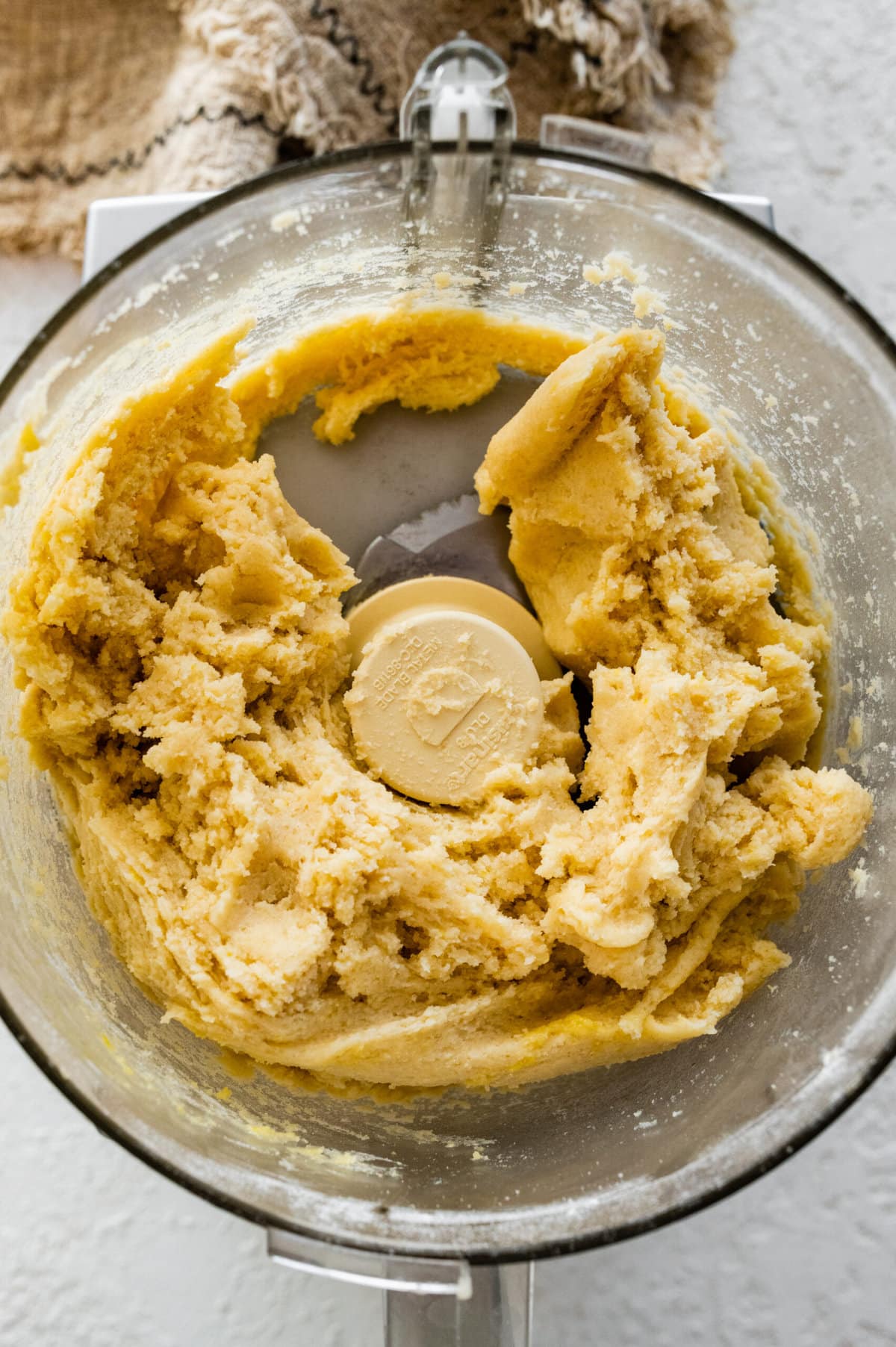
Add the egg and butter and cut them into the flour mixture in a food processor or with a fork or pastry cutter until the mixture resembles coarse breadcrumbs.
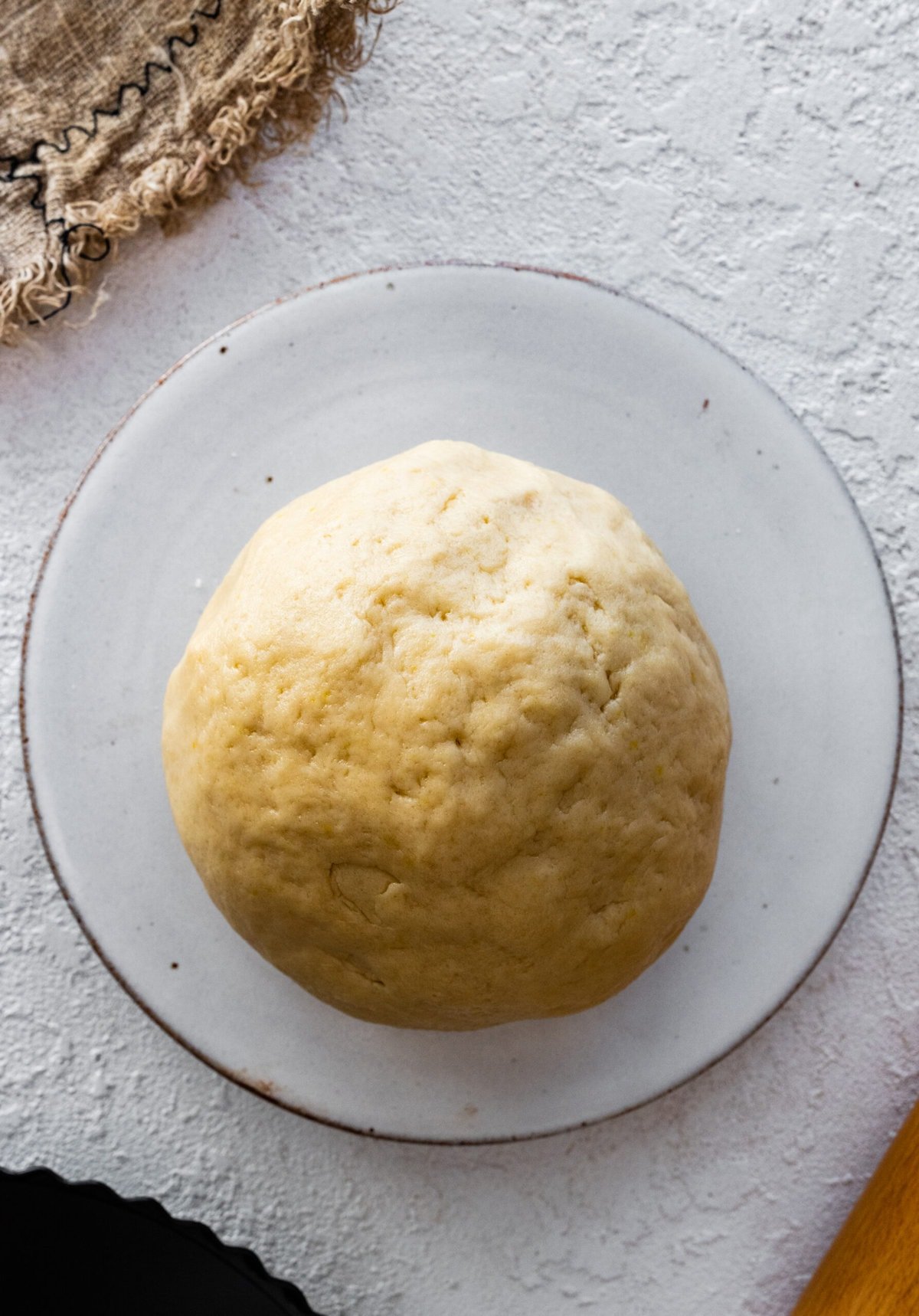
Mix the ingredients until the dough comes together. If the dough is too dry, add some cold water, one teaspoon at a time, until it forms a cohesive ball.
Turn the dough onto a lightly floured surface and knead it gently until a smooth dough ball forms. Roll the dough out using a rolling pin until about ¼ inch (½ cm) thick.

Grease an 8-10 inch tart pan with/a removable bottom with butter or cooking spray, lay the pastry over the pan, and tuck the edges until it fits evenly.
Assemble and Bake

Roll the rolling pin over the tart pan to discard any excess dough from the edges (you can also trim the edge with a knife).

Poke the base with a fork, cover with plastic wrap, and place it back in the fridge for 30 minutes.

Preheat your oven to 350°F (180°C).
Soak pine nuts in water for 5-10 minutes then drain and dry. This will prevent them from browning too fast in the oven.
Take out the prepared tart pan with pastry shell. Spread the cooled pastry cream over the pastry.

Sprinkle the pinenuts evenly over the top of the tart.
Bake in the oven for about 45 minutes or until the top is golden brown. If the pine nuts start to get too dark gently tent with tinfoil and finish baking.
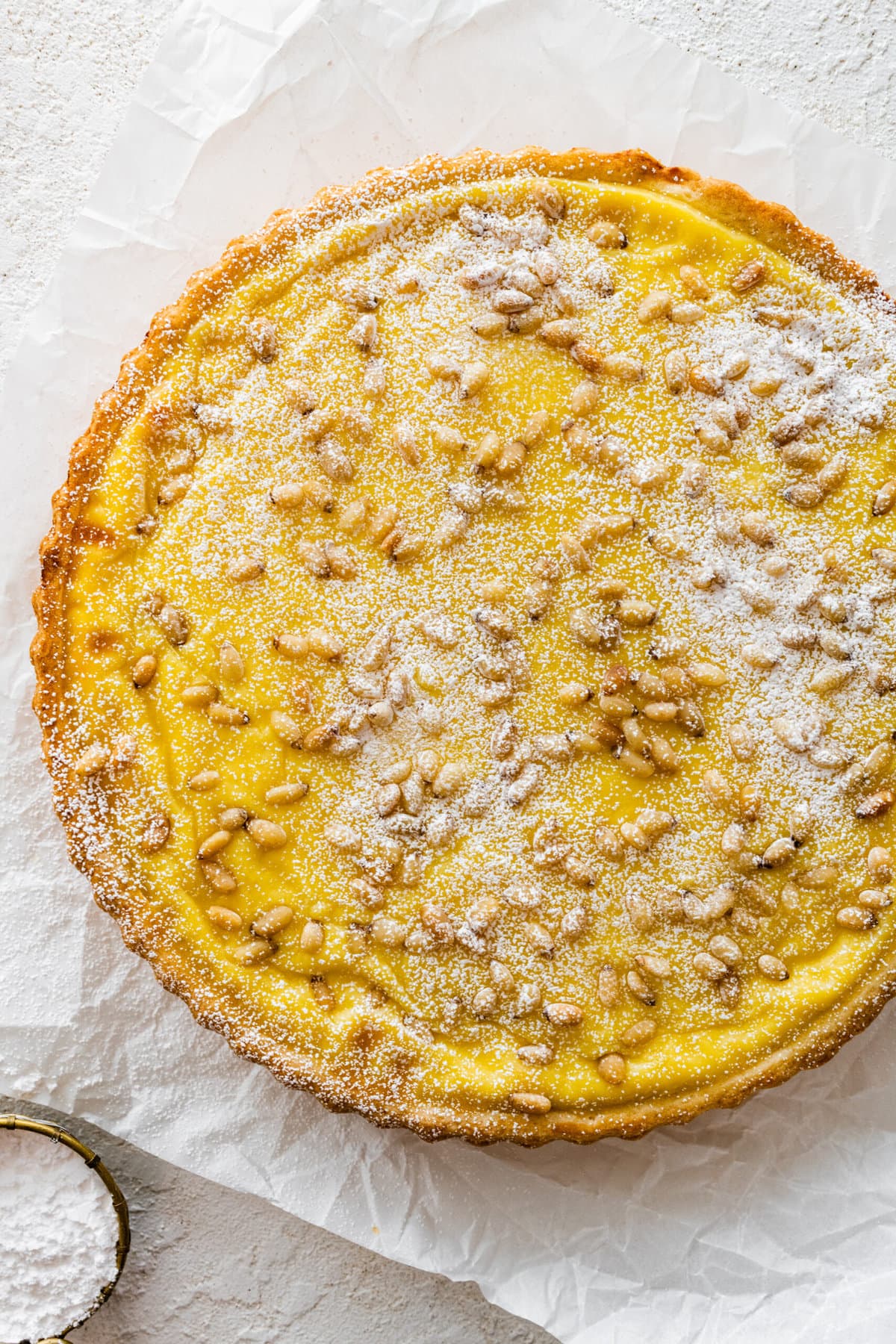
Allow the Torta della Nonna to cool completely before serving. Remove from tart case and place on a serving plate or platter. Dust with powdered sugar before serving.
Equipment
- 10-inch tart pan with removable base
- 9-10 inch Spring Form Pan
- Regular tart pan
Storage
Store in an airtight container in the refrigerator for up to 3 days.
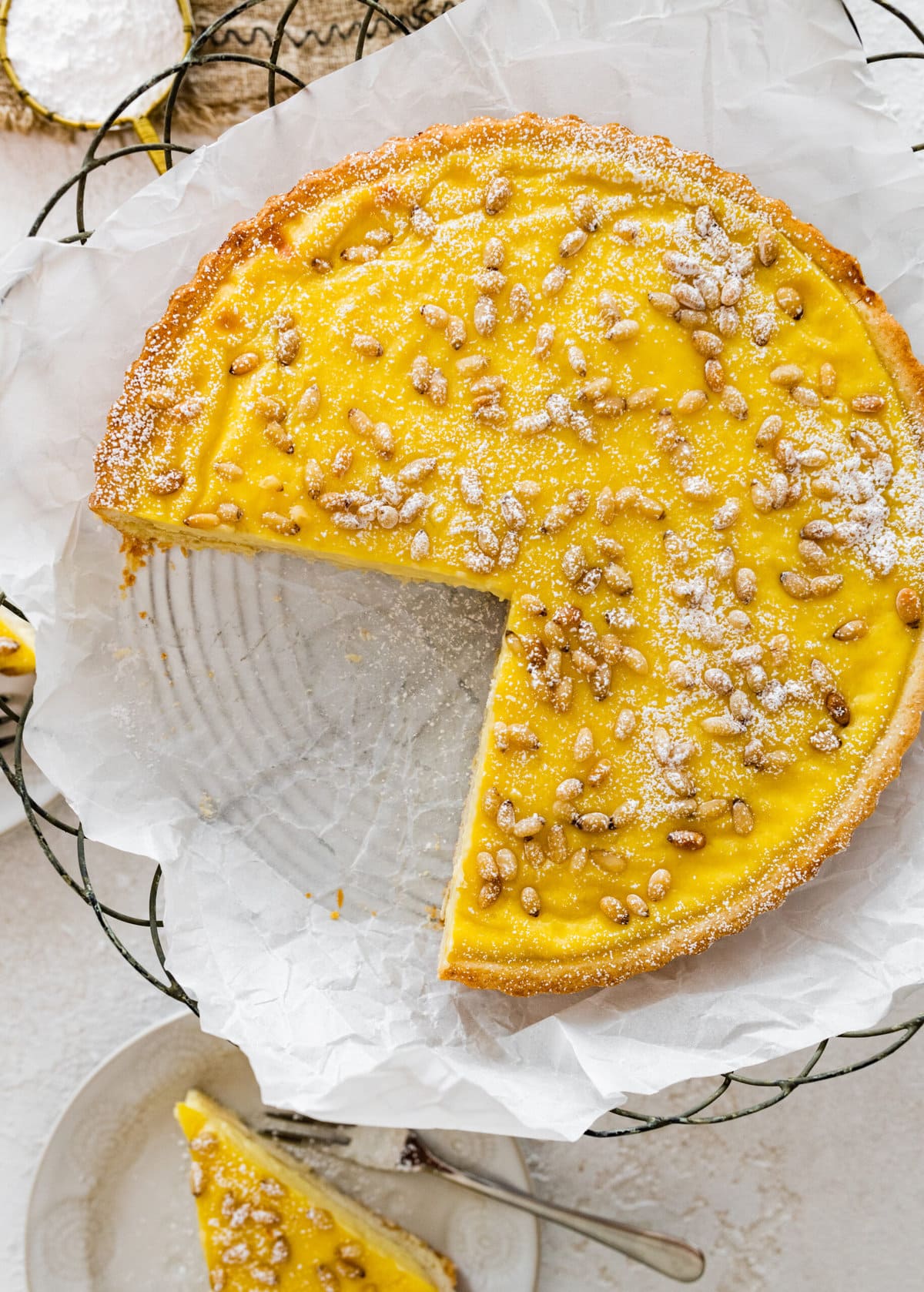
Top tips for best results
- Chilled Ingredients: Keep butter and eggs cold. Cold ingredients help maintain the flakiness of the pastry. Chill the pastry dough before rolling it out.
- Precision in Measurements: Be precise with measurements, especially for the pasta frolla and pastry cream. Accurate measurements ensure the right balance of flavors and textures.
- Gentle Pastry Handling: Handle the pasta frolla gently to avoid overworking the dough, which can result in a tough crust. Just bring the ingredients together until a cohesive dough forms.
- Even Pastry Thickness: Roll out the pasta frolla to an even thickness for consistent baking. An even crust ensures proper cooking throughout and an appealing texture.
- Chill Pastry Cream Thoroughly: Allow the pastry cream to cool completely before spreading it onto the pastry. Chilling the custard ensures it sets properly and maintains a creamy texture.
- Use Quality Vanilla: If using vanilla extract, opt for a good-quality pure vanilla extract. The flavor will shine through in the custard.
- Pine nuts – Make sure to soak the pine nuts for 5 minutes to stop them browning too quickly in the oven.
You will also love our Italian Cream Filled Pastry!
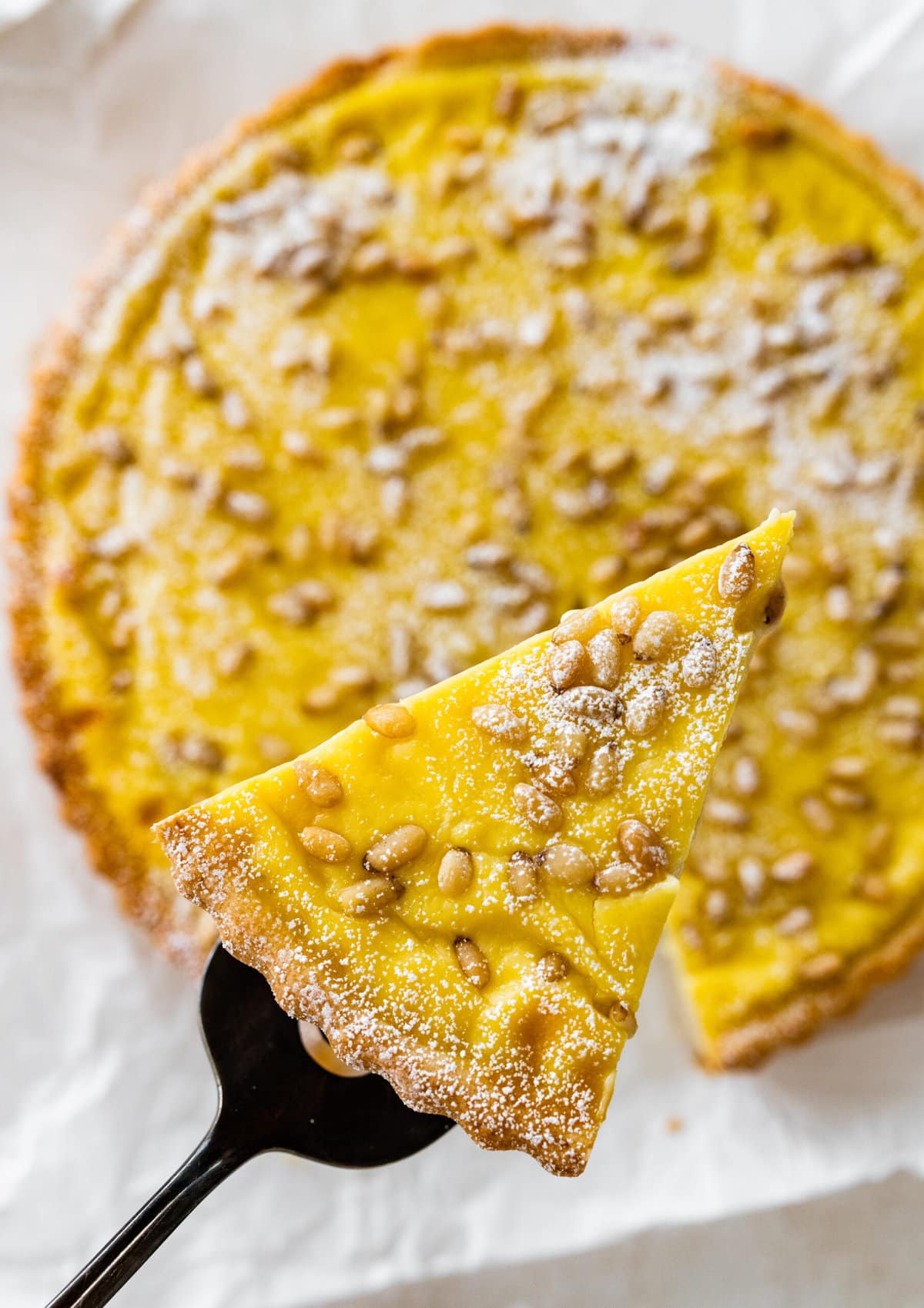
FAQs
Yes, you can prepare the pasta frolla ahead of time. Store it wrapped in plastic wrap in the refrigerator for up to 2 days. Alternatively, you can freeze the dough for longer storage. Thaw it in the refrigerator before using.
Yes, if you don’t have a tart pan with a removable bottom you can use a pie dish that is not too deep. You won’t get the ruffled edges, but it will still work great!

More Italian Recipes
Looking for other recipes? Try these:
Serving Suggestions

💙 MADE THIS RECIPE AND LOVED IT? 💙 Please leave a ⭐️STAR rating and COMMENT below- I love connecting with you! Tag me with your creations on Instagram and find me on Pinterest.
Torta Della Nonna Recipe (Italian Tart)

Ingredients
Pasta Frolla (Shortcrust Pastry):
- 2 cups all-purpose flour, 250g
- ½ cup granulated sugar, 100g
- ½ teaspoon salt
- ¼ teaspoon baking powder
- 9 tablespoons butter, cold and cut into small pieces, 120g
- 1 large egg
- Zest of half a lemon, optional
Pastry Cream (crema pasticcera):
- 4 medium egg yolks
- ½ cup granulated sugar
- ⅓ cup cornstarch
- 2 cups whole milk
- ½ teaspoon vanilla bean, scrape the inside of a vanilla bean pod. You can also use 1 tsp of good quality pure vanilla extract (optional substitute: almond extract)zest of half lemon
Topping:
- ¼ cup pine nuts
- powdered sugar, icing sugar, for dusting
Instructions
Pastry Dough:
- In a large bowl, combine the flour, baking powder, sugar, and salt. Wisk to combine.
- Beat the egg in a small bowl with the lemon zest.
- Add the egg and butter and cut them into the flour mixture in a food processor or with a fork or pastry cutter until the mixture resembles coarse breadcrumbs.
- Mix the ingredients until the dough comes together. If the dough is too dry, add some cold water, one teaspoon at a time, until it forms a cohesive ball.
- Turn the dough onto a lightly floured surface and knead it gently until a smooth dough ball forms. Roll the dough out using a rolling pin until about ¼ inch (½ cm) thick.
- Grease an 8-10 inch tart pan with/a removable bottom with butter or cooking spray, lay the pastry over the pan, and tuck the edges until it fits evenly. Roll the rolling pin over the tart pan to discard any excess dough from the edges (you can also trim the edge with a knife). Poke the base with a fork, cover with plastic wrap, and place it back in the fridge for 30 minutes.
Pastry Cream
- In a bowl, whisk together the egg yolks and sugar until pale yellow and creamy; use an electric mixer. Add the cornstarch and mix well.
- In a saucepan, heat the milk with vanilla bean (or extract) and lemon zest until it just starts to simmer. Remove from heat.
- Slowly pour the hot milk into the egg mixture, whisking constantly to avoid curdling.
- Pour the mixture back into the saucepan and cook over medium heat, stirring continuously until the custard thickens. This should take about 5-7 minutes. Once thickened, remove from heat and transfer the pastry cream to a clean bowl. Place plastic wrap directly on top of the cream so a skin doesn’t form. Set aside.
Assemble the Torta della Nonna:
- Preheat your oven to 350°F (180°C).
- Soak pine nuts in water for 5-10 minutes then drain and dry. This will prevent them from browning too fast in the oven.
- Take out the prepared tart pan with pastry shell. Spread the cooled pastry cream over the pastry. Sprinkle the pinenuts evenly over the top of the tart.
- Bake in the oven for about 45 minutes or until the top is golden brown. If the pine nuts start to get too dark gently tent with tinfoil and finish baking.
- Allow the Torta della Nonna to cool completely before serving. Remove from tart case and place on a serving plate or platter. Dust with powdered sugar before serving.
Notes
-
- Chilled Ingredients: Keep butter and eggs cold. Cold ingredients help maintain the flakiness of the pastry. Chill the pastry dough before rolling it out.
-
- Precision in Measurements: Be precise with measurements, especially for the pasta frolla and pastry cream. Accurate measurements ensure the right balance of flavors and textures.
-
- Gentle Pastry Handling: Handle the pasta frolla gently to avoid overworking the dough, which can result in a tough crust. Just bring the ingredients together until a cohesive dough forms.
-
- Even Pastry Thickness: Roll out the pasta frolla to an even thickness for consistent baking. An even crust ensures proper cooking throughout and an appealing texture.
-
- Chill Pastry Cream Thoroughly: Allow the pastry cream to cool completely before spreading it onto the pastry. Chilling the custard ensures it sets properly and maintains a creamy texture.
-
- Use Quality Vanilla: If using vanilla extract, opt for a good-quality pure vanilla extract. The flavor will shine through in the custard.
-
- Pine nuts – Make sure to soak the pine nuts for 5 minutes to stop them browning too quickly in the oven.
Nutrition
Nutrition information is automatically calculated, so should only be used as an approximation.
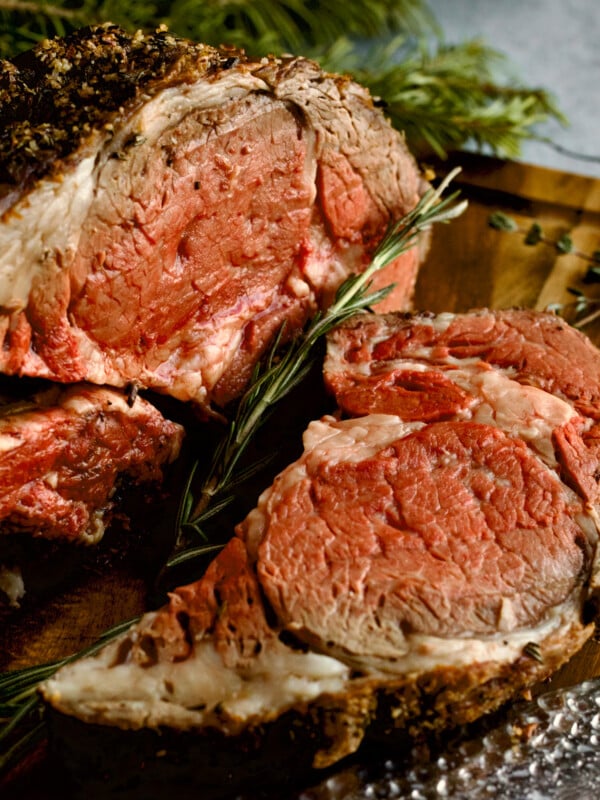
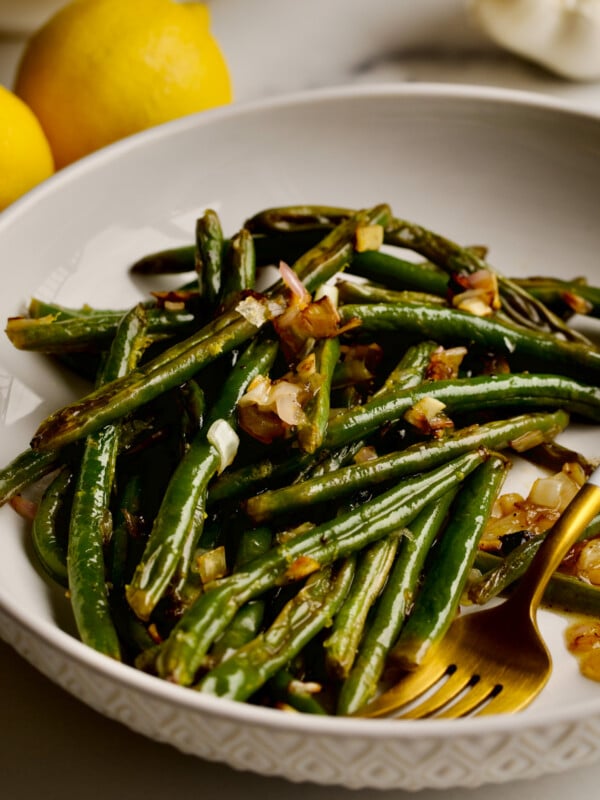
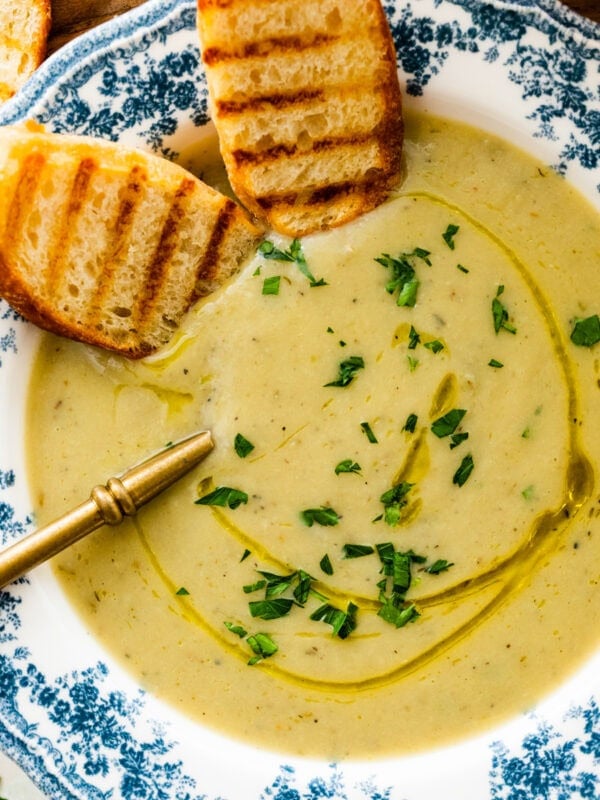
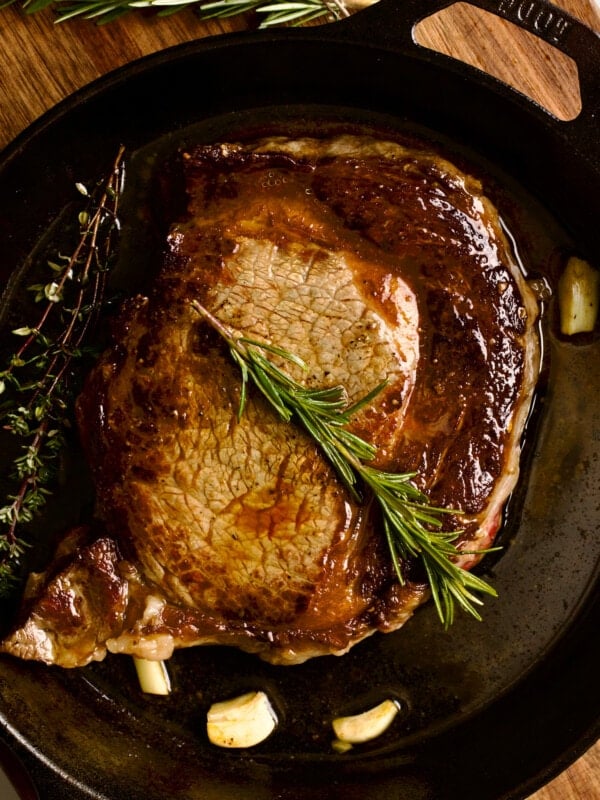
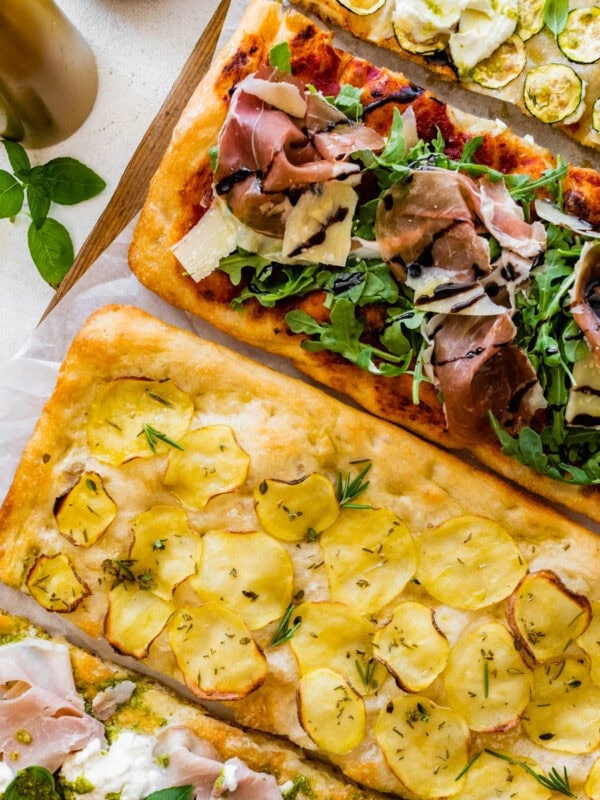
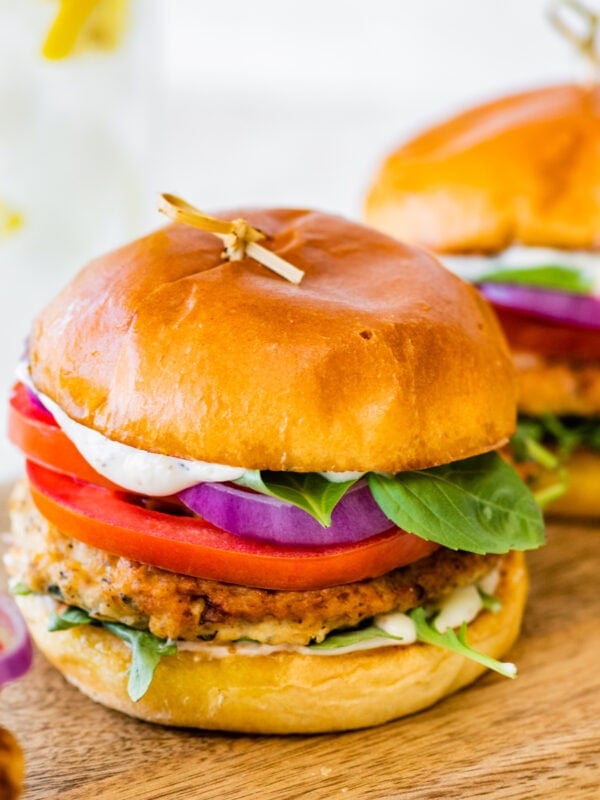
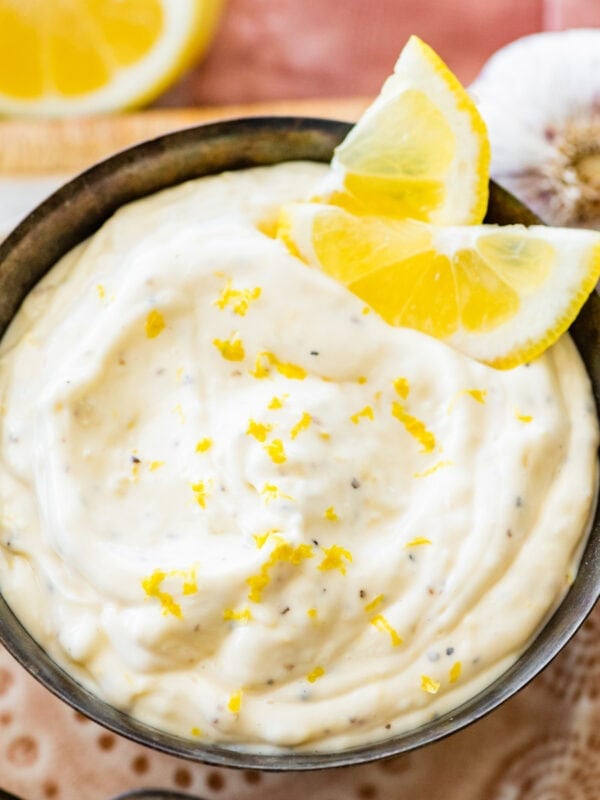
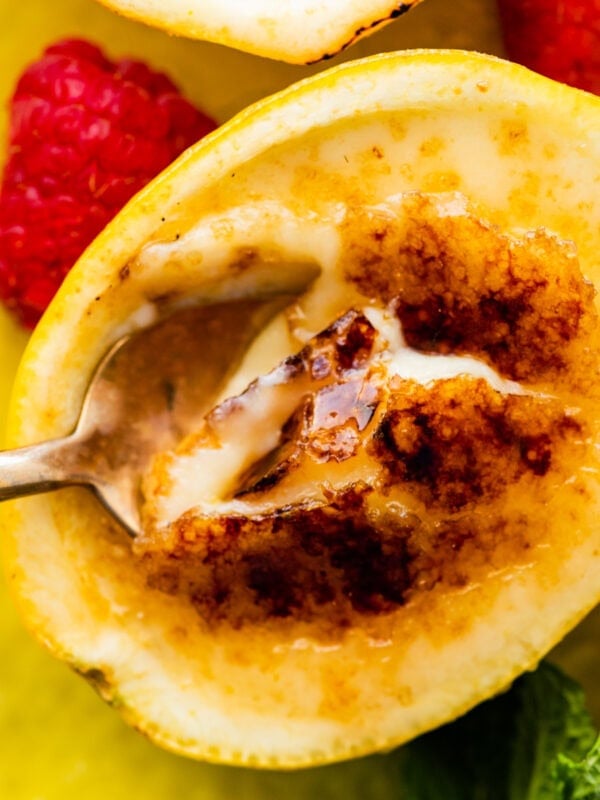
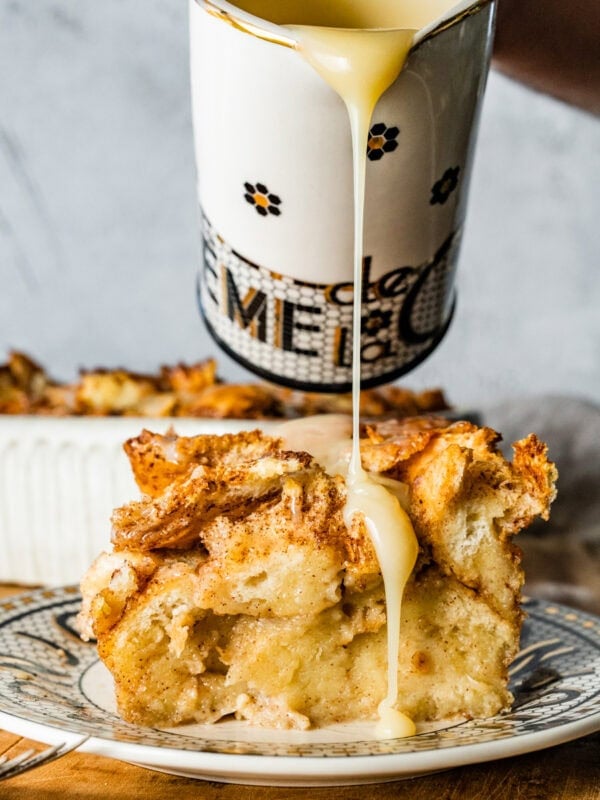
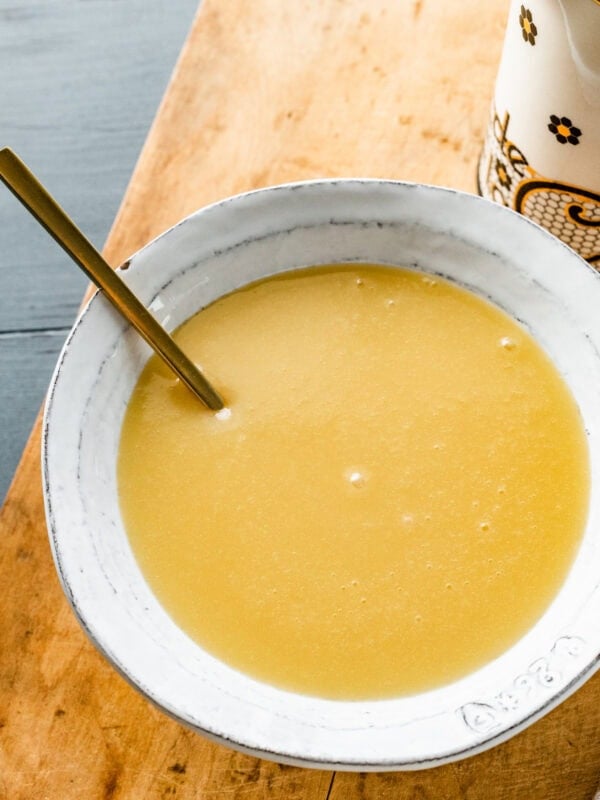

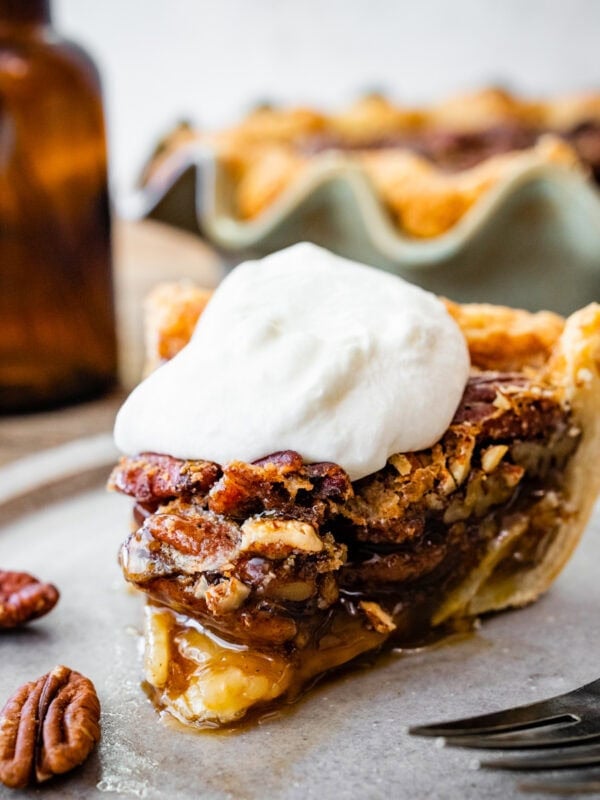




Looks disgusting. Like worms or maggots are sitting on top of the custard. Thanks a lot for sharing this recipe.
Hi! I’m very sorry you managed to confuse a dessert topping for critters. Perhaps instead of critiquing a stranger’s photo that stays true to a classic Italian recipe, you could educate yourself on what pine nuts are. Hoping you’ll give this traditional Italian dessert a try!
The best traditional torta della nonna recipe!